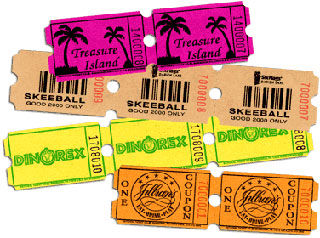
Vol. XVII, No. 7, November 2017
Ticket or ticketless? The truth revealed

Since the introduction of gameroom debit cards a number of years ago, there has been a continuing discussion, actually a debate, in the community leisure venue (CLV) and FEC industries about whether gamerooms should still have paper redemption tickets versus going ticketless using only debit card electronic credits. Many CLVs have opted to eliminate the tickets based on the cost of tickets and labor involved, believing that going ticketless doesn't have any impact on game play or revenues. We've seen chains such as Dave & Buster's go that route. Meanwhile, Chuck E. Cheese's recently switched to debit cards from tokens, but they continue to have their redemption games spit out paper tickets.
So what is the truth? Is there any negative impact on revenues when tickets are eliminated?

How can invisible electronic credits on a plastic debit card replace this?
When it comes to gamerooms that attract a large number of younger children, child development gives us a clear direction. Young children can't comprehend that there are virtual tickets on the debit card as they lack abstract reasoning, which is required for that understanding. Young children can only comprehend the concrete, the real physical world. A wide body of research on child and brain development has conclusively established that children don't really begin to develop abstract reasoning until around age 10 or 11. Jean Piaget, the development biologist who devoted his life to observing and recording the intellectual abilities of children at their different ages, identified abstract reasoning as part of the formal operational stage of development. Prior to that stage, children are in the concrete operational stage of development where they can only think about and comprehend actual physical objects and cannot handle abstract reasoning.
So when it comes to younger children, being able to handle and collect paper tickets has meaning and value. The idea that there are virtual ticket credits in their debit card account does not compute. Such digital credits have little if any value to them compared to the value of seeing, physically handling and holding, and collecting real tickets.

We've heard the argument that now that children are using tablets and even smartphones, their brains have acquired the ability to comprehend digital credits. Nothing could be further from the truth. It has taken tens of thousands of years for our brain development to get to where it is today. Our brains evolved in a physical world, so they developed to responding to that world, not a digital one. The brain's programming doesn't suddenly change in just a few years. Evolution works incredibly slowly. Children's brain development is exactly the same as it was hundreds of years ago and is consistent throughout the world.
Paper tickets have even higher appeal to children starting around age 5 when they become interested in collecting things. By somewhere between the ages of 6 and 8, most children become completely intrigued by collecting.
Another value that paper tickets have for children is the entertainment value of feeding them into ticket eaters.
It's interesting that when Chuck E. Cheese's recently introduced debit cards to their over 520 stores, they still keep the redemption tickets and ticket eaters.
Paper tickets not only have higher value than electronic credits to children, but also for older children and adults as well. New research by Ozgun Atosoy and Carey Morewedge just published this month in the Journal of Consumer Research finds that physical items are more valuable than digital possessions. The researchers conducted five different experiments, which found that people ascribed less value to digital than to physical versions of the same good. The research participants paid more for, were willing to pay more for, and were more likely to purchase physical goods than equivalent digital goods. In their experiments, tourists donated more money to charity in exchange for a physical rather than a digital souvenir photograph; people indicated higher purchase intention and willingness to pay to purchase physical rather than digital books and movies, and business students indicated a higher willingness to pay to purchase physical then digital textbooks.
The researcher said an association with self (i.e., psychological ownership) and greater perceived control of physical goods underlies the greater value ascribed to them compared to their digital counterparts.
The research corroborated five additional earlier research studies that also found that people value digital goods less than their physical counterparts.
Atosoy's and Morewedge's research is consistent with research on the use of credit cards versus real money. People tend to spend more when using credit cards versus cash and feel less pain of paying when using them. This is consistent with reports we received from a number of national coin-operators who place games in FEC gamerooms. When they switched from tokens to debit cards, game revenues went up, collaborating that digital currency has less value in terms of attachment to it and is less painful to spend then using physical currency (tokens).
In a series of consumer studies done by consumer psychologists Avni Shah and colleagues and reported in their 2015 research paper found that shoppers who paid cash to buy something increased their emotional attachment with the purchase compared to credit card users.
One restaurant franchise operator has reported a decline in business from frequent eaters when the restaurant chain switched from the paper punch frequent eater cards (10 punches and you get one free) to a digital program. The act of holding and keeping the punch card reminded members they belonged and reminded them how many punches they earned and encouraged them to get all the punches (visits) they needed to get a freebie.
Redemption is all about earning currency to purchase redemption prizes. It's also about the thrill of winning. Watching 100 tickets spit out of a game for a high score is far more rewarding, plus garners more envy from other people in the gameroom and social capital for the winning player than seeing some number of credits appear on a screen and invisibly go into your electronic account. Holding the tickets and turning them in, perhaps with the entertainment of the ticket eater consuming them, just adds to the value of winning and spending them.
Many CLV and FEC operators, in naïve enthusiasm for the convenience of going ticketless in their gamerooms, most likely are losing revenues, not only from child game players, but also from adults. And based on preliminary reports we've received from a very respected coin-operator who is running a true test, the loss of redemption game revenues from going ticketless could approach 20% or more.
Yes, replacing the physical with the digital is not always the best route.


